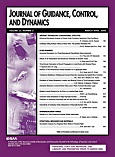
JOURNAL OF GUIDANCE CONTROL AND DYNAMICS
Scope & Guideline
Pioneering Research in Dynamics and Guidance
Introduction
Aims and Scopes
- Guidance and Navigation Systems:
Research related to the design and optimization of guidance algorithms for various aerospace applications, including spacecraft trajectory planning, missile guidance, and UAV navigation. - Control Systems Engineering:
Development and implementation of control strategies for maintaining stability and performance in dynamic systems, particularly in aerospace contexts such as flight control systems and robotic spacecraft. - Trajectory Optimization:
Focus on methodologies for optimizing trajectories for spacecraft, aircraft, and other vehicles, considering constraints such as fuel efficiency, time, and safety. - Dynamic Modeling and Simulation:
Innovative techniques for modeling the dynamics of aerospace systems, including the effects of uncertainties and perturbations in various environments. - Autonomous Systems and Robotics:
Exploration of autonomous control systems for spacecraft and aerial vehicles, emphasizing machine learning and adaptive control strategies. - Safety and Robustness in Control:
Research aimed at ensuring the safety and reliability of control systems, particularly in the presence of uncertainties and disturbances. - Collaborative and Cooperative Control:
Studies on multi-agent systems and cooperative strategies for tasks such as formation flying and coordinated maneuvers among multiple vehicles.
Trending and Emerging
- Machine Learning and AI in Control:
The integration of machine learning and artificial intelligence in control systems design is on the rise, with applications ranging from adaptive flight control to predictive maintenance and anomaly detection. - Autonomous Systems and Robotics:
A growing focus on autonomous systems, including drones and robotic spacecraft, emphasizes the development of advanced algorithms for navigation and control in unstructured environments. - Resilience and Robustness in Systems:
Research on resilient control systems that can adapt to unexpected disturbances and maintain functionality is gaining momentum, reflecting a broader trend towards safety and reliability. - Sustainable and Green Technologies:
There is an increasing emphasis on sustainable aerospace technologies, including energy-efficient flight systems and environmentally friendly propulsion methods, driven by global sustainability goals. - Collaborative Multi-Agent Systems:
The study of collaborative and cooperative strategies among multiple autonomous agents, such as formation flying and swarm robotics, is becoming more prominent in the literature. - Real-Time and Adaptive Control:
Emerging methodologies for real-time adaptive control systems are gaining traction, enabling systems to adjust dynamically to changing conditions and requirements.
Declining or Waning
- Traditional Control Methods:
There has been a notable decline in the publication of papers focused on classical control techniques, such as PID controllers, as newer adaptive and learning-based methods gain traction. - Basic Astrodynamics:
Research centered on foundational astrodynamics concepts appears to be waning, possibly as more complex and practical applications are prioritized over theoretical explorations. - Static System Analysis:
The emphasis on static analysis methods, which do not account for dynamic changes in systems, has decreased as the field shifts towards more dynamic and real-time approaches. - Non-Autonomous Systems:
There is a diminishing focus on non-autonomous and manually controlled systems in favor of fully autonomous and intelligent systems that incorporate advanced technologies. - Linear Control Theory:
Interest in linear control theory is declining as researchers increasingly explore nonlinear control strategies that offer greater flexibility and robustness in real-world applications.
Similar Journals
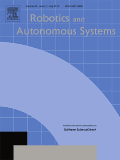
ROBOTICS AND AUTONOMOUS SYSTEMS
Fostering Breakthroughs in Autonomous Research.ROBOTICS AND AUTONOMOUS SYSTEMS, published by Elsevier, is a leading journal in the fields of robotics and automation, providing a platform for the dissemination of high-quality, peer-reviewed research. With an impressive impact factor and a prestigious reputation, this journal is classified in the Q1 category for major fields including Computer Science Applications, Control and Systems Engineering, Mathematics, and Software as of 2023. The journal boasts an extensive archive dating back to 1988, reflecting the evolution of the discipline and fostering innovative research discussions that are crucial for advancements in autonomous technologies. Researchers, professionals, and students are encouraged to contribute to and benefit from the ongoing dialogue within these dynamic fields. Accessible through various academic resources, ROBOTICS AND AUTONOMOUS SYSTEMS stands as a pivotal information source for those dedicated to exploring the frontiers of intelligent systems.
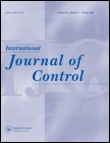
INTERNATIONAL JOURNAL OF CONTROL
Exploring Innovations in Dynamic SystemsINTERNATIONAL JOURNAL OF CONTROL, published by Taylor & Francis Ltd, stands as a prominent platform for scholarly exchange in the fields of control and systems engineering as well as computer science applications. Established in 1965, this esteemed journal has successfully contributed to advancing knowledge up to the year 2024, making it a vital resource for researchers and engineers dedicated to the development and application of dynamic systems. With an impact factor that demonstrates its relevance in the academic community and classification in the Q2 quartile for both Computer Science Applications and Control and Systems Engineering, the journal continues to attract high-quality, peer-reviewed articles. Researchers looking for a comprehensive perspective on control theories, methodologies, and innovations will find this journal indispensable. While it does not offer open access, readers affiliated with institutions can typically access its content through academic libraries. By fostering critical dialogue and promoting cutting-edge practices within its realms, the INTERNATIONAL JOURNAL OF CONTROL remains an essential contributor to the global academic conversation.
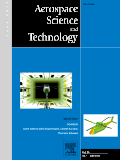
Aerospace Science and Technology
Pioneering Innovations in Aerospace EngineeringAerospace Science and Technology, published by ELSEVIER FRANCE-EDITIONS SCIENTIFIQUES MEDICALES ELSEVIER, is a leading journal in the field of aerospace engineering, boasting an impressive 2023 Q1 ranking and a significant position in the Scopus Ranks, where it stands at Rank #7 out of 153 in the Engineering - Aerospace Engineering category, reflecting its credibility and impact with a 95th percentile ranking. Since its inception in 1997, this journal has provided a robust platform for the dissemination of pioneering research and advancements in aerospace technology, focusing on innovative methodologies and applications in the aerospace sector. With a commitment to open access, researchers, professionals, and students can easily engage with cutting-edge findings that drive the industry forward. The journal not only seeks to expand knowledge but also aims to foster collaboration among scholars across the globe, making it an essential resource for anyone looking to stay at the forefront of aerospace innovation. For more information, visit its website or refer to its dedicated address at 65 Rue Camille Desmoulins, CS50083, 92442 Issy-Les-Moulineaux, France.
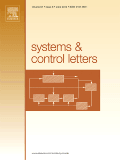
SYSTEMS & CONTROL LETTERS
Exploring the Nexus of Technology and Engineering SolutionsSYSTEMS & CONTROL LETTERS is a prestigious journal published by ELSEVIER, dedicated to the advancement of knowledge in the fields of Systems and Control Engineering. With an ISSN of 0167-6911 and E-ISSN 1872-7956, this journal has become a cornerstone for academics and professionals alike, featured in the top quartile (Q1) categories for Computer Science (miscellaneous), Control and Systems Engineering, Electrical and Electronic Engineering, and Mechanical Engineering as of 2023. The journal encompasses a broad scope of interdisciplinary research and technological advancements, providing a forum for innovative ideas that can shape modern engineering practices. Despite being a subscription-based journal, its impact is underscored by significant Scopus rankings, with a notable placement in the 70th percentile for General Computer Science and consistent recognition across multiple engineering disciplines. With origins dating back to 1981 and converging through to 2024, SYSTEMS & CONTROL LETTERS continues to serve as an essential resource for researchers seeking to publish high-quality research, thereby fostering collaboration and knowledge dissemination within the engineering community.
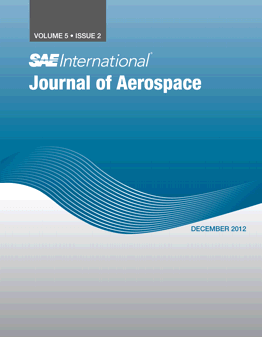
SAE International Journal of Aerospace
Pioneering Insights in Aerospace Engineering.The SAE International Journal of Aerospace, published by SAE International, serves as a critical platform for innovative research and advancements within the field of aerospace engineering. With an ISSN of 1946-3855 and an E-ISSN of 1946-3901, this esteemed journal contributes significantly to the body of knowledge in the aerospace sector, boasting a convergence span from 2008 to 2024. While currently categorized in Q4 of Aerospace Engineering, the journal is dedicated to fostering emerging ideas, technologies, and methodologies that could eventually elevate its standing. Although it does not offer open access options, the journal ensures wide dissemination of its well-curated articles to aid researchers, professionals, and students in staying abreast of the latest developments and trends. Given its distinct focus and commitment to the aerospace community, the SAE International Journal of Aerospace plays an essential role in bridging theory and practice, making it a valuable resource for those within this vital and evolving field.
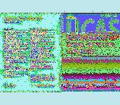
INTERNATIONAL JOURNAL OF CONTROL AUTOMATION AND SYSTEMS
Innovating Systems Engineering for a Smarter Tomorrow.INTERNATIONAL JOURNAL OF CONTROL AUTOMATION AND SYSTEMS is a distinguished scholarly journal published by the Institute of Control Robotics & Systems in collaboration with the Korean Institute of Electrical Engineers. Since its inception in 2003, the journal has contributed significantly to the domains of Control and Systems Engineering and Computer Science Applications, attaining a commendable Q2 ranking in both fields as of 2023, thereby positioning itself at the forefront of academic inquiry and innovation. With an ISSN of 1598-6446 and an E-ISSN of 2005-4092, this journal serves as a platform for disseminating cutting-edge research and advancements in control automation technologies. Although it operates under a subscription model, the journal maintains a high impact factor, underscoring its relevance and appeal to researchers, engineers, and students alike who seek to expand their knowledge and apply theoretical insights in practical scenarios. We invite you to explore and contribute to the ongoing discourse that shapes the future of automation and control systems.
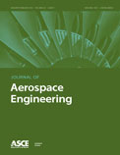
JOURNAL OF AEROSPACE ENGINEERING
Shaping the future of aerospace with cutting-edge research.JOURNAL OF AEROSPACE ENGINEERING, published by the American Society of Civil Engineers (ASCE), is a premier scholarly journal that serves as an essential resource for engineers and researchers in the aerospace engineering domain. With an ISSN of 0893-1321 and an E-ISSN of 1943-5525, this journal has been dedicated to advancing knowledge since its inception in 1988 and will continue to do so through to 2024. The journal is categorized in the Q2 quartile across multiple engineering disciplines, including Aerospace Engineering, Civil and Structural Engineering, Materials Science, and Mechanical Engineering, reflecting its reputable standing in the community. The impact factor speaks to its influence and relevance, making it a critical reference for ongoing research and innovations. Although this journal does not offer open access, it ensures that its content is comprehensive, engaging, and peer-reviewed, targeting a diverse audience of professionals, academics, and students involved in the fields of aerospace engineering and related disciplines. The journal actively contributes to shaping future engineering practices, showcasing cutting-edge research and fostering collaboration among discipline experts.
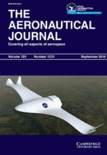
AERONAUTICAL JOURNAL
Advancing aerospace knowledge since 1969.Aeronautical Journal, published by Cambridge University Press, is a premier scholarly journal dedicated to advancing the field of aerospace engineering. With a notable impact factor, this journal holds a strong position in the academic community, ranked #53 out of 153 in the Scopus category of Aerospace Engineering, placing it in the 65th percentile. The journal has been providing a platform for groundbreaking research since its inception in 1969, and continues to be a vital resource for researchers, professionals, and students involved in aeronautics. As a Q2 journal in the 2023 Aerospace Engineering category, it offers high-quality articles that cover a range of topics within the discipline, contributing to the ongoing discourse and innovation in aerospace technologies. Although not an open-access journal, it remains accessible to a vast readership through institutional subscriptions and partnerships. The Aeronautical Journal is a crucial publication for those seeking to stay at the forefront of aerospace research and development.

NONLINEAR DYNAMICS
Unraveling Complexities in Nonlinear SystemsNONLINEAR DYNAMICS is an esteemed academic journal published by SPRINGER, focusing on a diverse range of topics within the fields of Aerospace Engineering, Applied Mathematics, Control and Systems Engineering, Electrical and Electronic Engineering, Mechanical Engineering, and Ocean Engineering. Since its inception in 1990, this journal has become a premier platform for disseminating cutting-edge research and innovative methodologies from both theoretical and practical perspectives. With a high impact factor and ranked in the Q1 quartile across several engineering and mathematics categories, NONLINEAR DYNAMICS is recognized for its significant contribution to advancing knowledge and technology in nonlinear phenomena. Researchers and professionals are encouraged to engage with this journal to publish their findings and stay at the forefront of developments. Although it does not offer open access options, the journal ensures rigorous peer review, enhancing the credibility and visibility of published work.
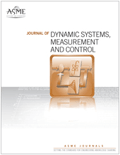
JOURNAL OF DYNAMIC SYSTEMS MEASUREMENT AND CONTROL-TRANSACTIONS OF THE ASME
Elevating understanding in dynamic systems and control mechanisms.JOURNAL OF DYNAMIC SYSTEMS MEASUREMENT AND CONTROL - TRANSACTIONS OF THE ASME is a renowned periodical published by the American Society of Mechanical Engineers (ASME), focused on advancing the field of dynamic systems, measurement, and control. With a rich publication history spanning from 1971 to 2025, this journal serves as a pivotal platform for disseminating high-quality research aimed at enhancing understanding and innovation in various sectors, including mechanical engineering, control and systems engineering, and information systems. The journal currently holds a respectable Q2 category ranking in multiple fields, reflecting its commitment to excellence and rigorous peer-review standards. Although it does not offer open access, its extensive reach within the academic community exemplifies its significance, making it an indispensable resource for researchers, professionals, and students eager to engage with cutting-edge advancements. For those seeking to expand their knowledge and contribute to the dialogue surrounding dynamic systems and control mechanisms, JOURNAL OF DYNAMIC SYSTEMS MEASUREMENT AND CONTROL stands out as a critical reference.